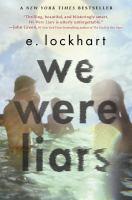
Cadence Sinclair Eastman is a Sinclair— a family with a noble, white, reputable history in America. Sinclairs are happy. Sinclairs aren’t addicts. Sinclairs are not failures. Sinclairs are the epitome. Every year, she goes to the Sinclairs’ private island owned by her Granddad just off of Cape Cod to spends her summers with her cousins and divorced aunts… and an Indian boy named Gat who has stolen her heart. However, during summer fifteen, something happened. Something bad. Now, she’s 17 and is going back to the island. After having spent two summers away recovering from an accident-caused amnesia that occurred on the island. Here’s the thing, though: no one is telling her what happened before her accident. Her mission on summer seventeen is to uncover the truth surrounding her circumstances, sort out her love life and spend her idyllic summer vacation in peace with her cousins and not-quite-boyfriend just as they had done before everything happened. But will she succeed? What is it that she’s not being told? Find out in E. Lockhart’s slow-unraveling novel!
I would hope every book I read is a good read. This novel was one of those good reads. A read that I am proud to have placed into my finite ‘Yeah, I Read That” list. At the start, I wasn’t that hooked in. There was far too much exposition, in my humble opinion, and the book was far too confusing. However, as the story progressed, and the author unfolded her ideas into neat little words written on rectangular pieces of paper, all the confusion started clearing. As I kept reading, I started thinking that the book was far too short.
I loved how certain paragraphs were written like poems, as it showed the author not only focused on the written aspect of writing the novel, but also the stylistic and symbolic aspects. By around Chapter 5, I was hooked into finding out what was unfolding, thinking I had an idea about what could have happened to Cady.
Boy, was I wrong.
The character interactions lulled me into a sense of security about my prediction and my hope for the ending of this novel. But, I was mistaken. At first, I was thoroughly surprised and wondering how this could have possibly happened, around 200 pages in. Then, just as quickly, the ending made sense. I accepted it. I mean, the groundwork was there, at the very beginning. There were obvious clues. Obvious hints. I just didn’t pick up on them as I was too thoroughly focused on progressing through the novel.
Now, that paragraph above probably won’t make sense to people who haven’t read the book yet. After you do, though, it (hopefully) will. This novel, I will once again repeat, is very similar to “The Fault in Our Stars” by John Green. There is a reason why John Green’s endorsing book blurb of a sentence is on the cover. The book is truly unforgettable. A fantastic read. A read, which I hope you too, will place in your finite “Yeah, I Read That” list.
